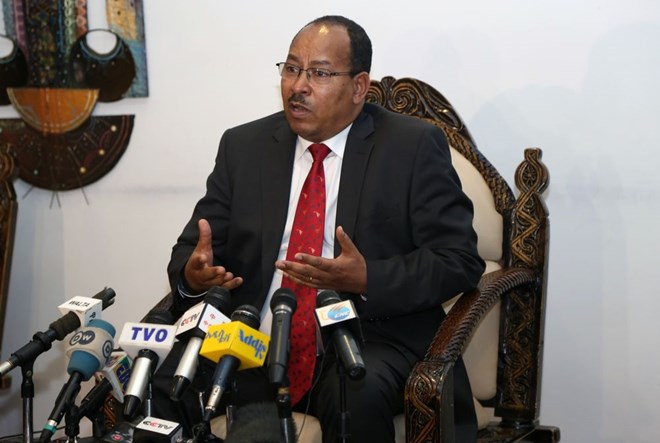
Friday November 3, 2017
By Nizar Manek

Motuma Mekassa / Photographer: Minasse Wondimu Hailu/Anadolu Agency via Getty Images
China Poly Group plans to start exporting natural gas from Ethiopia’s eastern Ogaden basin by mid-2019 as it continues to explore near the border with Somalia, Petroleum Minister Motuma Mekassa said.
Shipments from the Calub and Hilala fields will be exported along a 700-kilometer (435-mile) pipeline to a port complex being built in neighboring Djibouti, Motuma said in an interview in the capital, Addis Ababa.
“They want to export the gas to Asia,” Motuma said.
Ethiopia is developing gas finds to diversify its $72.3 billion economy, the fastest-growing in Africa over the past decade. The Horn of Africa nation plans to increase natural resources’ contribution to gross domestic product to 10 percent from 1.5 percent by 2025, when it expects to become a middle-income country with gross national income per capita of $1,045 to $12,736.
POLY-GCL Petroleum Group, a partnership between China Poly and closely held Hong Kong-based Golden Concord Group, signed five production-sharing agreements with Ethiopia’s Mines Ministry in 2013 to explore a 117,151 square-kilometer area in the Ogaden basin, according to Motuma.
The project is being financed by the China Development Bank, according to Motuma, who declined to provide a cost estimate, citing continuing work by POLY-GCL and its sub-contractors. At least 4.5 trillion cubic feet of gas has so far been discovered in the fields, he said, citing an analysis by POLY-GCL.
Troops Deployed
Ethiopian soldiers are providing security around the five blocks owned by POLY-GCL, Motuma said. In April 2007, an Ethiopian rebel group, the Ogaden National Liberation Front, attacked a site operated by China’s Zhongyuan Petroleum Exploration Bureau, killing nine Chinese workers and 65 Ethiopians.
A tripartite agreement on the pipeline is expected to be signed by representatives of Djibouti, Ethiopia and POLY-GCL “in the coming weeks,” Djibouti Ports & Free Zones Authority Chairman Aboubaker Omar Hadi said by phone from Tokyo.
POLY-GCL’s first exports of 3 million cubic meters of LNG per year are planned to start within 30 months when the new port in Djibouti is expected to be operational, he said. The shipments are expected to increase to 6 million cubic meters in the port’s second year of operations, Hadi said. The port will include a gas liquefaction plant.
Financing Secured
Djibouti has secured $4 billion in finance “from different sources” that will enable work on the project to start in Damerjog, north of the country’s border with Somalia, he said.
Jacqueline Chang, assistant to the general manager of POLY-GCL’s Ethiopia branch, didn’t respond to two emailed requests for comment for the company.
SouthWest Energy Ltd. of Ethiopia, Vancouver-based Africa Oil Corp., and GBP Global Resources, a unit of Russia’s state-owned Gazprombank Group, are all exploring for oil and gas in Ethiopia, with feasibility studies underway in some areas, according to Motuma. He didn’t provide details. Spokesmen for the three companies didn’t respond to emails seeking comment.
Gas reserves were first discovered in the Ogaden basin in 1972 by a U.S. company, Tenneco, which was expelled from the country five years later by a Marxist military junta known as the Derg, according to the government. Soviet Petroleum Exploration and Expedition began exploring the reserves after Tenneco’s expulsion, before its contract was terminated in 1994, after the Derg was toppled by the Ethiopian People’s Revolutionary Democratic Front, which has remained in power since then.
The government wants to increase foreign-exchange earnings from sales of minerals, oil and gas to $2 billion a year by 2020 from $344 million in 2015.